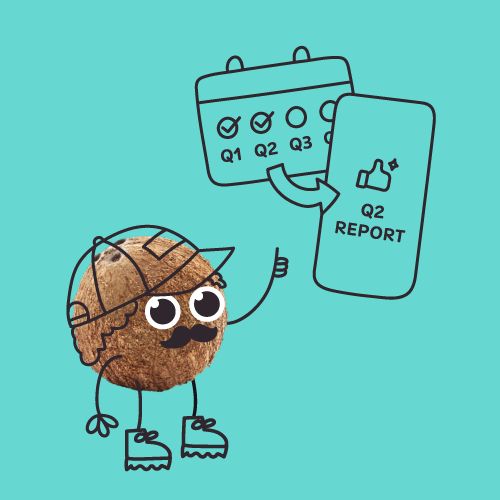
Image credit: Adobe StockOne bank statement.One never-ending list of transactions.We’ve all been there.The fact is, 70% of all sole traders (people who run their own business as an individual and are self-employed) still use their personal account to pay for everything. Business, pleasure, household bills and everything else in between.This might feel like an easy option for the busy, fast-paced life of a freelancer, but it does not serve you and your business well, creating a financially unstable solution to managing your money. The good news is, it’s a very simple problem to fix.Here’s why separating your self-employed expenses from your personal expenses is a good idea:
1. Save Time on Your Tax Return
Picture this.It’s January, the month of the tax return. Spreadsheet open, floor covered in bank statements and receipts. A towering wall of used coffee cups blocks all natural light from the window, casting you deep in the shadows of a year-long cycle of procrastination. ‘Damn you, tax return’

Image credit: Marta AltésIf you relate to this common tale of tax return woe, then we have some good news. It can be avoided with the simple act of separating your business expenses from your personal expenses.Let's take a look...*****Which of the following transactions are business expenses?Pret a manger - £6.70INT’L 00891248379 - £14.99Paypal payment - £7.99TFL Travel Ch - £2.49The Post Office - £6.99*****The reality is, if you're using one account for both your personal and business expenses, it's going to be tricky to remember what was what.Let's look again, but this time with one key difference; every payment was made with a business account, set up especially to pay for all of your business expenses.*****Which of the following transactions are business expenses?INT’L 00891248379 - £14.99TFL Travel Ch - £2.49The Post Office - £6.99*****You paid for these transactions using your business account, so the answer can only be ‘All of the above’. Simple.Imagine if your tax return was this straightforward. One simple bank statement, with every transaction that's relevant to your business.
2. Improve Cash Flow
Behold. The magnificent money mirage.

Your business has just been paid and thoughts quickly turn to that well earned holiday you’ve been dreaming of. After half an hour googling with a quick check on Skycanner, you’re off to the Caribbean. Perfect. Well… not really. The rent on your workspace comes out of your account tomorrow, along with your monthly subscription to Dropbox and Adobe.Suddenly, that holiday doesn’t seem quite so achievable after all...The fact is, it’s very difficult to keep track of your money when using the same account for both business and personal use.Instead, keep your personal money separate from your business’s money and you’ll always know how much you have, making it easy to stay on top of your finances.It’s the difference between being able to take a holidayand relax, and taking a holiday and worrying about your next bill.
3. Keep HMRC Happy
It’s been a good year. Everyone wants to hire you, invoices are flying out the door, money is coming in and your business is in full swing. There’s no time for any of that tax business, none of that paperwork. It can wait. And does it really matter if you forget the odd receipt and don’t capture that small job you did on the side?The answer is yes.

Image credit: The Excorcist, Warner BrosHMRC can audit you at any time and the more mistakes you make, the more likely it is to happen.The solution is simple. Keep your business and personal expenses separate.Implement a system that clearly outlines your business income and expenses, and don’t cut corners. That two minutes it could’ve taken you quickly turns into hours when asked to provide paperwork and proof of earnings.Not only this, but it could possibly open up HMRC to investigate all of your expenses and income on that personal bank account, regardless of the ones you specify are business related. Imagine having to explain that the £100 birthday income from your family and HMRC querying whether it was sales income.
Keep Your Business and Personal Expenses Separate
The first step to getting ready for the tax year ahead doesn't need to be complicated. Keep your personal expenses out of your self-employed expenses.Open a separate business account with a separate debit card and use that to pay for all of your business expenses.Finding the best business account for you is now easier than ever. Gone are the days of attending countless meetings with your branch manager, photocopying a hundred years worth of paperwork and spending huge amounts of money on banking fees. Services like Coconut offer people the chance to register for a new account in a couple of minutes from the comfort of their own home using just their phone and some ID.










